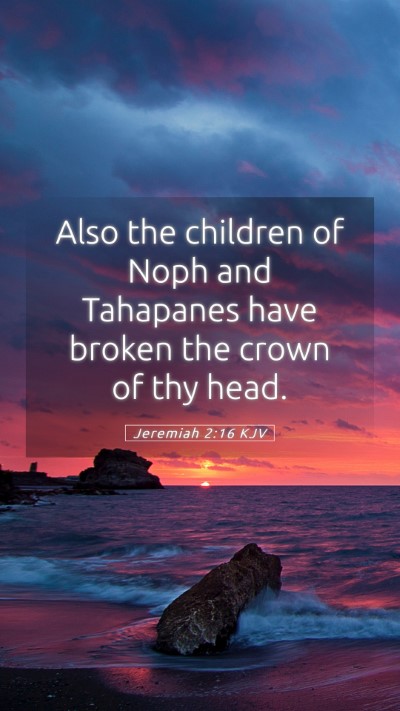Understanding Jeremiah 2:16
Jeremiah 2:16 states, "The children also of Noph and Tahapanes have broken the crown of thy head." This verse serves as a profound statement of Israel's betrayal and the consequences faced due to their infidelity to God.
Bible Verse Meanings
This passage encapsulates the theme of disloyalty and the dire implications of turning away from the divine. The prophet Jeremiah, tasked with delivering God's message, highlights the folly of nations that have contributed to Israel's downfall.
Bible Verse Interpretations
-
Matthew Henry's Commentary:
Henry emphasizes that the nations mentioned, Noph and Tahapanes—Egyptian cities—signify the political alliances Israel had turned to for security instead of relying on God. This turning away reflects a broader theme of idolatry and misplaced trust.
-
Albert Barnes' Notes:
Barnes points out that these cities symbolize weakness and represent a loss of dignity for Israel. The breaking of the crown illustrates how Israel's former glory was dismantled by unfaithfulness to Yahweh.
-
Adam Clarke's Commentary:
Clarke interprets the verse critically, noting that it serves as a warning against associating with those unfriendly toward God's covenant. He sees this as a metaphor for the disgrace Israel brought upon itself through its actions.
Bible Verse Explanations
In this verse, the phrase "have broken the crown of thy head" serves as a metaphor illustrating a loss of authority and dignity. It signifies the collapse of leadership in Israel, a direct result of abandoning the sovereignty and guidance of God.
Scripture Analysis
This verse invites us to reflect on the consequences of unfaithfulness and the importance of maintaining a right relationship with God. The analysis also raises questions regarding contemporary church practices and theological abandonment that can lead to spiritual decline.
Biblical Exegesis
Exegesis of this verse involves understanding its historical context during Jeremiah's time—a period of national crisis in Judah. The alliances with Egypt, rather than trust in God, depict a deep-seated rejection of divine help, leading to destruction.
Bible Study Insights
As we engage in Bible study, insights from this verse should prompt believers to consider what modern equivalents of idolatry or misplaced trust exist today. It raises important questions about our dependencies on worldly solutions over divine guidance.
Cross References
- Isaiah 31:1 - "Woe to those who go down to Egypt for help..."
- Jeremiah 2:11 - "Hath a nation changed their gods..."
- Psalm 118:8-9 - "It is better to trust in the Lord than to put confidence in man..."
Application of Jeremiah 2:16
For contemporary readers, this verse serves as a reminder against alliances that compromise faith. It encourages an examination of where trust is placed—in human efforts or divine providence. The call is clear: rely on God to maintain spiritual integrity and avoid the pitfalls depicted in this passage.
Conclusion
Jeremiah 2:16, therefore, conveys a critical message about loyalty to God amidst external pressures. Understanding this verse enriches our grasp of Scripture, helping believers draw vital life applications from ancient truths.


